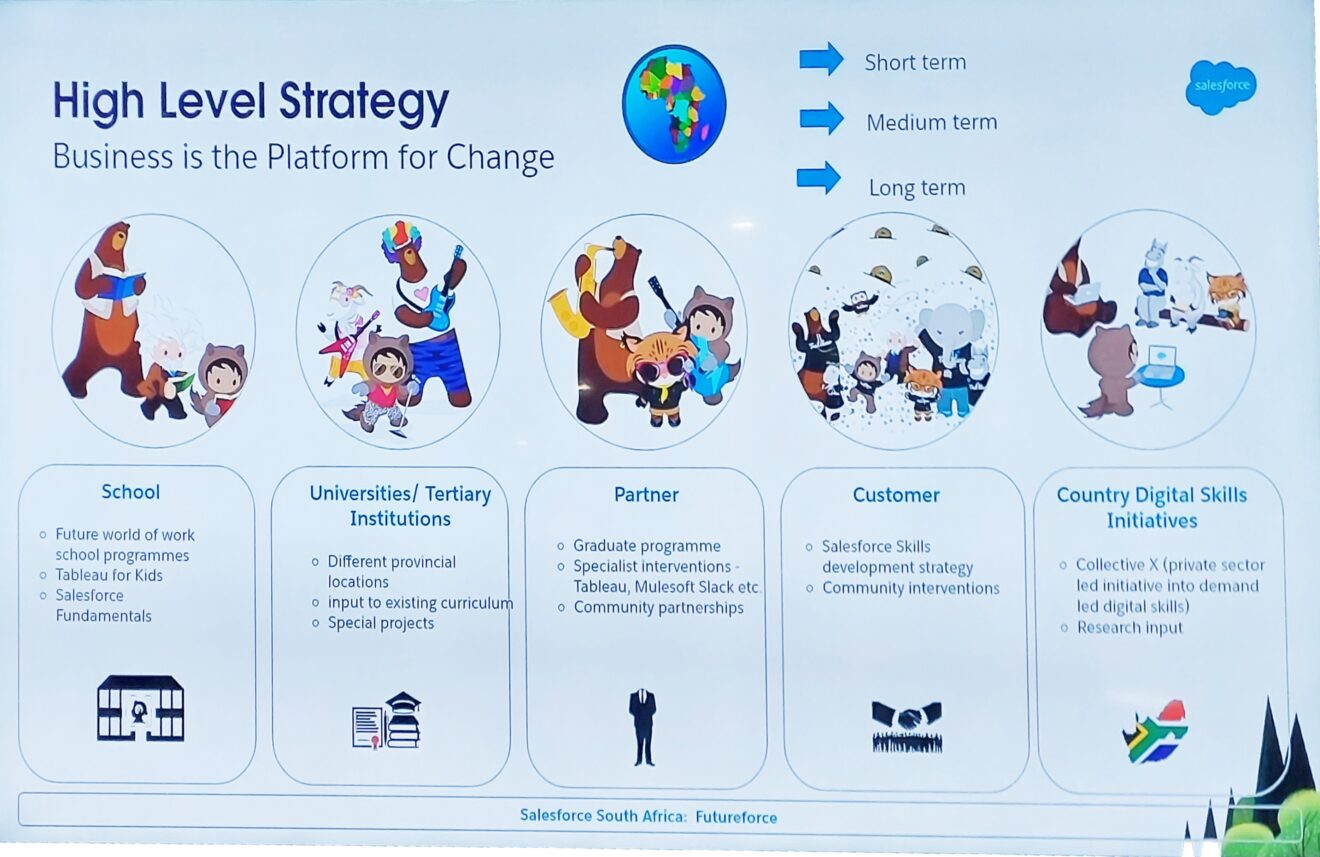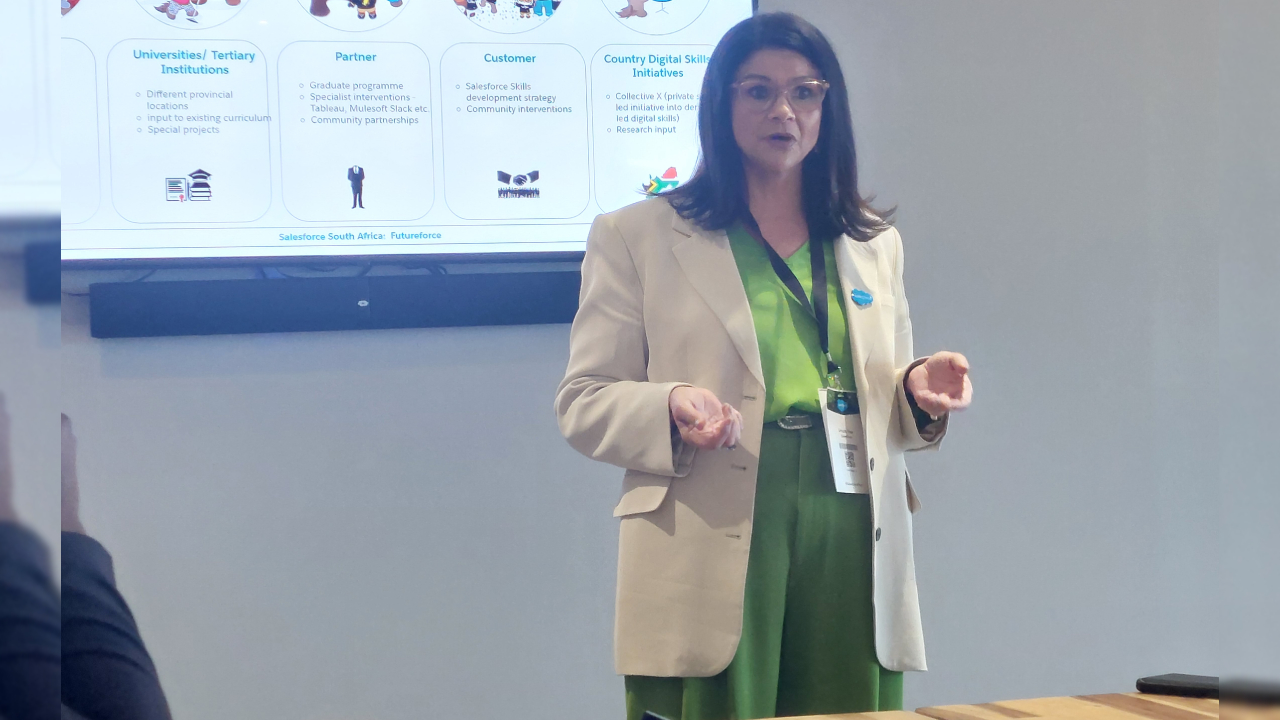- CRM vendor Salesforce is aware of South Africa’s tech skills shortage and wants to make a difference.
- The company is engaged in a long-term upskilling strategy that sees it target schools, universities and workplaces.
- Salesforce is leading a group of private companies in teaching people in-demand tech skills, relating, of course, to its products.
Global tech giant Salesforce has made it clear that South Africa is its most important market on the continent, and is aggressively pursuing upskilling in the country in order to expand its so-called “customer ecosystem.”
On Wednesday, Hypertext was invited to the Salesforce World Tour Essentials event held in Johannesburg, South Africa. Salesforce, which was ranked as the top customer relationship management (CRM) software vendor in the world by the IDC, was keen to showcase its latest products at the event which hosted thousands of businesses from across Africa at the Kyalami Convention Centre.
We’re in Kyalami today for the Johannesburg leg of the #Salesforce Tour. There is a keynote from Zuko Mdwaba, Salesforce Area VP forAfrica Executive and SA Country Leader this morning so stay tuned. pic.twitter.com/sLPDuvLvm8
— Hypertext (@htxtafrica) June 14, 2023
One of which was Einstein GPT, a combination of its in-house “Einstein” artificial intelligence, with OpenAI’s ChatGPT large language model. The new software is being touted as the first AI for CRM and will be integrated across the company’s suite of products.
During the event, the senior talent programme manager for Salesforce, Ursula Fear (pictured in the header image), spoke to the media about the company’s upskilling strategy. Fear explained that Salesforce is looking to engage South Africa’s education industry at scale, a plan it originally unveiled in October 2022.
“In a bizarre kind of way businesses like Salesforce are becoming educationalists whether we like to or not,” Fear told Hypertext. This is because the country has a dire digital skills shortage.
A SAP report published in March outlined that four in five surveyed organisations in South Africa, Nigeria and Kenya reported some negative effects from a lack of tech skills, with nearly all organisations expecting to face tech skills-related challenges in 2023.
Factors leading from the local tech skills shortage include the inability to meet client needs, reduced capacity for innovation and losing customers to competitors.
Salesforce has also noted the skills shortage and is working towards teaching people how to use its technology in the hopes of uplifting the local tech industry, which will have the knock-on effect of making its CRM the first choice since the company wants to grow skills in its own ecosystem of customers.

The company is planning to begin targeting schools with “Future World of Work” programmes which will teach young children fundamentals of Salesforce’s software like Tableau. Tertiary institutes are also in the sights for Salesforce. Fear recently met with universities in Gauteng like the University of the Witwatersrand (Wits) and the University of Pretoria (UP) in order to gauge interest in adding courses or modules related to its software.
“Institutions are saying that they want to work closer with industry and some are exploring data management, so there is some interest there,” Fear adds.
At the University of Pretoria, Fear and her team managed to include certain courses on company products such as Tableau in the Knowledge Management module offered by UP.
“South Africa has the right skills to work on Salesforce products, and the implication is digital transformation and taking organisations into the future. But we are at the time of where we have to look at how we do things,” she told us.
“We’ve got no shortage of potential. But we have to re-look and re-imagine how we grow skills. A 30 percent pass mark? Ain’t gonna crack it.”
Salesforce is also leading a group of educational institutions in its upskilling endeavours. This group is called The Collective X and includes local training partners like TechnoGirl, TeamoTech, CodeX, Harambee, Cape Innovation and Technology Initiative, We Think Code, Geeks4Learning, and more.
Fear said that initially Salesforce was upskilling employees and potential employees in-house, but decided to start the collective in order to save money.
Additionally, Salesforce is engaging graduates with programmes and courses on its software, as well as communities across the country. To that end the company is preparing to run an associate-level course in July. Here participants will learn how to use Salesforce software, including its latest products, and receive certification for their CVs.
Fear makes an optimistic point for the country, telling us that, “in South Africa, there is no lack of jobs, just a lack of the right skills for those jobs.”

